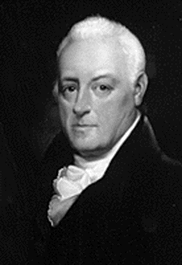Robert Yates Storms Out Of The Constitutional Convention
Robert Yates was a delegate to the Constitutional Convention.
Unhappy with the proceedings, Yates left the Convention early and fought tooth and nail to deny ratification of the Constitution.
Robert Yates
Robert Yates was a self-made man.
After training as a surveyor, Robert read law with William Livingston. He would continue in both professions throughout his life.
Yates became a leading citizen of Albany, NY, writing the first reference book outlining all the laws in that city.
A New New York
Shortly before the Revolutionary War began, Robert was elected to the city council. Although not a member of the Sons of Liberty, he did join the Committee of Correspondence.
In early 1775, Yates was sent to the New York Provincial Assembly. In this office he was assigned to the committee which drafted the State Constitution.
Having firmly proven his status as one of the great legal minds in New York, Robert was selected to sit as an original member of the State Supreme Court.
Constitutional Convention
Having spent most of the 1780’s tending to New York business, Robert Yates was sent (along with John Lansing and Alexander Hamilton) to the Philadelphia Convention.
Expecting to simply revise the Articles of Confederation, Yates was surprised to learn that the Virginia and Pennsylvania delegations were in favor of writing a new Constitution. They wanted to move from a Confederation to a centralized, National Government. Yates was just one of the many representatives who were shocked by this new upon their arrival.
Fortunately for the modern historian, Robert took notes during his time at the Convention. He (along with James Madison) gave us an overview of the proceedings for this secret meeting.
Unfortunately for the modern historian, Yates left early.
Leaving Phillie
Robert Yates and John Lansing left the Constitutional Convention in early July. They’re reason was that creating a new government exceeded their instructions and they could not in good faith overstep their permissions.
Furthermore, Yates absolutely hated the idea of a National Government. New York, in his opinion, was just fine on its own and didn’t need to give legal supremacy to a distant ruler.
Yates and Lansing wrote a letter to Governor George Clinton explaining their early exit and declaring their opposition to the new Constitution.
Anti-Federalist
During the Ratification Debates, Robert Yates became a leader of the Anti-Federalists. He published several pamphlets under a pseudonym rallying against the proposed Government. (There is still a debate about who the true author of many of these pamphlets is/are, but Yates was at least consulted and most probably the main author.)
Yates attended the New York Ratification Convention and acted as the strongest opponent of the Constitution. Despite his best efforts, New York approved the change and joined the Union.
Acknowledging his defeat, Robert supported his country’s decision and in order to avoid future suspicion he took an oath of allegiance to the United States.
Chief Justice of New York
Following the Convention, the Anti-Federalists of New York nominated Robert Yates for the office of Governor.
He ran twice: first against his old ally George Clinton, then against Chief Justice of the Supreme Court John Jay. He lost both times.
Yates did receive a promotion to Chief Justices of the New York Supreme Court. He spent his final days in this, one of the highest offices in the State.
If you want to learn about others who fought the Constitution, check out our stories on Timothy Bloodworth and Rawlins Lowndes.
As Robert Yates was an author of some of ‘The Anti-Federalist Papers’ it is a great opportunity for me to recommend owning a copy yourself. Pick up a copy for yourself through our Amazon affiliate link below.
If you are new to this site, make sure you subscribe to our email list to receive our daily articles.






